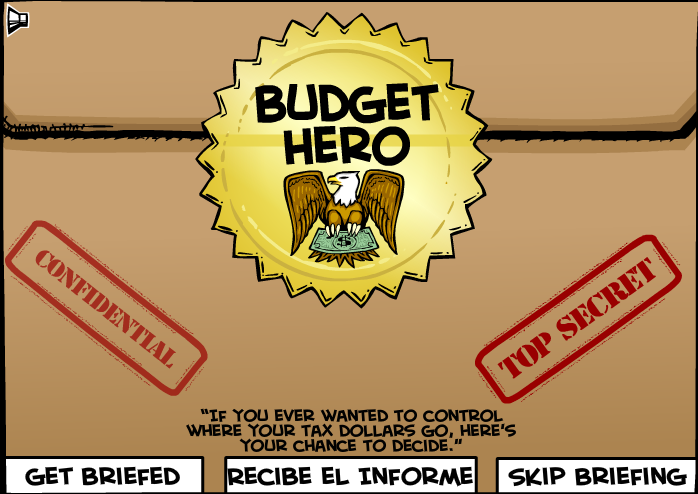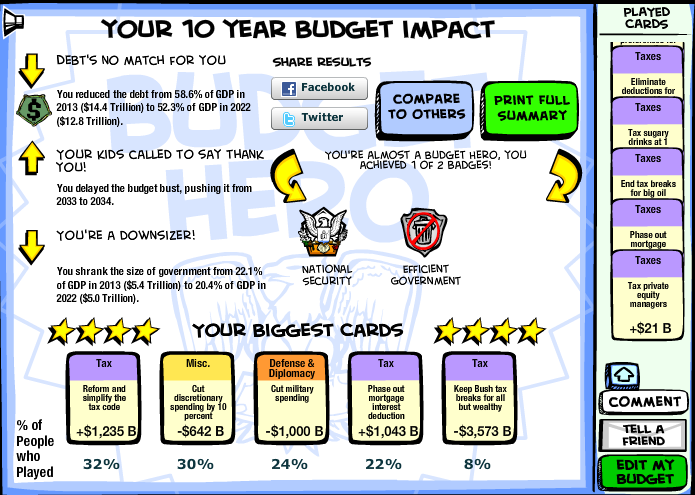Introduction
Budget Hero is a Flash browser Federal Policy Simulation game.
The serious goals of the game were to "create a "serious" game that would help the public better understand the complicated federal budget process while also increasing awareness of the social and fiscal impact of the government policies currently under discussion during the election year." 360Kids
The basic premise of the game is to try to control the federal budget.
Below is a detailed analysis of this game roughly following Brian Winn's1 Design/Play/Experience framework, including:
The intended outcomes of playing the game:
To educate Americans especially students about the federal budget.
To help students become informed voters.
To show that a sustainable federal budget requires trade-offs among a variety of priorities due to scarcity.
To show competing viewpoints on federal funding of programs.
To show how changes in federal funding can affect the population and distinct groups in various ways.

Learning
Storytelling
The narrative for Budget Hero is the doom and gloom surrounding the federal deficit and that the player can be a Budget Hero and "fix" the budget.
The game uses the mouse for point and click action. The graphics and sound effects reinforce the idea that the budget is out of control. An example would be how the Medicare and Social Security buildings are so high, the top extends beyond the UI. One design element interfering with learning were the policy cards being cutoff by the card place holder on the right of the UI.
Budget Hero is a web browser flash game. I believe using a web browser game was a smart move for the developers because they were able to reach a wide audience.
I found several sites that discussed player data collected from the game but I did not find a formal or informal assement of the game itself. The serious goals for the game can be assessed by creating a control group of students who get classroom instruction on the federal budget and by creating a pretest and post test for players of the game.
Budget Hero does a great job of helping the public understand the complexities of federal budget and increases awareness of the social and fiscal implications of decisions made during the game. However, I found this game very frustrating because there is no way to win the game without taking away seniors Social Security and Medicare away from the poor.
Postmortem: Getting Serious With Budget Hero

In the game briefing, the player is told they will be able to decide how their tax dollars are spent in the federal budget using a set of values chosen at the begining of the game. The setting is a 2D cityscape where each building represents a government department. The departments are Defense & Diplomacy, Schools & Kids, Science & Nature, Housing & Living, Misc. (discretionary spending federal and travel budget) Infra-Structure, Health Care, and Social Security.
Gameplay

Players are able to choose between 10 badges that match their values. The badges are broken down by stereotypical values such as, Republican and Democrat, Health & Wellness, Green, Energy Independence, National Security, Fiscal Cliff, Safety Net, Competitive Advantage, and Efficient Government. The player must choose at least one badge to start the game and can start the game with a maximum of three badges. The player is then given a set of cards from each government department and the taxes category. The player must choose between cutting programs and spending to increase programs while at the same time keeping an eye on the national debt, Deficit/surplus, size of government and the date that country goes bankrupt.
The challenges of trying to control the federal budget while at the same time trying to adhere to your values supports the learning goal of explaining the complexity of the federal budget and how public policy can impact the deficit. The challenges interfere with the learning goals because the values are stereotypical values. For example, the game does not allow for a fiscally conservative Democrat or a socially liberal Republican.
The game was well balanced in that it provided a starting point for understanding and discussion of the federal budget.

User Experience
Technology
Assessment
Conclusion
References
Budget Hero The Educational Games Database
To the president and Congress: A message from America's Budget Heroes